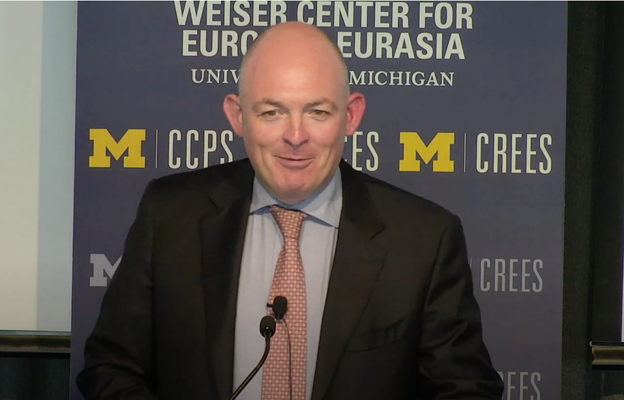In it he said that, “with the departure of the United Kingdom from the European Union we are now the only substantive common law jurisdiction left”.
Acknowledging that there are common law elements to Malta and Cyprus he said they were much smaller countries and that they are not primarily English-speaking countries, and ‘that means that there is less of a common law anglosphere voice in the European Union and Ireland is going to have to speak more loudly to ensure that its voice and the common law tradition are heard and respected’.
The lecture at an alma mater of his reflects on the relationship between Ireland, the US and Europe, entitled ‘Closer to Michigan or Madrid? Reflections on Ireland’s Unique Geopolitical Position’, a title that borrows from former Minister Mary Harney’s oft-quoted observation that Ireland could be considered closer to Boston than Berlin in many respects.

Attorney General Rossa Fanning speaking at the University of Michigan this month on the topic 'Closer to Michigan or Madrid? Reflections on Ireland's Unique Geopolitical Position'.
In his Weiser Center for Europe and Eurasia Lecture at the University of Michigan’s LSA International Institute, Fanning gave his insights on the triangular relationship between Ireland, the US and Europe, and the role played by the US legal system in influencing its young, developing Irish counterpart, especially in the early decades after independence and the ‘clear pattern of influence and fruitful engagement’ between the US and Irish Courts.
Fanning said the Warren Court era in the United States had influence on the Irish courts of the time. ‘In the 1960s onwards in both the United States and in Ireland there were strong activist courts and that led to a lot of social change. The Warren Court ordered the desegregation of schools...invalidated prohibitions on interracial marriages...and beyond the area of civil rights, the Warren Court enhanced the freedom of expression for journalists, to free speech in the context of defamation law and upheld rights of privacy to allow access to contraception...’ In Ireland around the same time the Irish Supreme Court led by Cearbhall ? D?laigh ‘developed a doctrine of unenumerated rights which started to afford constitutional protection to an expansive and open-ended list of Rights not expressly identified in the Irish Constitution as such and this sort of parallel liberal trajectory from the Irish Supreme Court and the U.S Supreme Court at around the same time occurred in different societies and for somewhat different reasons but there is absolutely no doubt that the Irish case was influenced by the American case.’
However, the question as to whether Ireland’s legal and political system is more influenced by the US or British traditions has been superseded by Ireland’s membership of the EU, said Fanning. ‘I think more often now the question for Ireland isn’t the question that it was in the 1960s which is “Should we follow Washington or should we follow London? The question now is do we follow the Anglosphere view of the world or do we follow the Continental European view of the world.’
Reflecting on the parallels between the US, British and Irish common law legal systems he observed that there are some areas where there are greater similarities between the Irish and British systems, for example in having a parliamentary system, as distinct from a presidential executive system, where the head of state is an executive, rather than a largely ceremonial figurehead, the tradition applying in the Irish Constitution and the UK. On the other hand, the existence of writtten Constitutions in Ireland and the United States results in fundamental similarities between the Irish and American systems.
As to the embedded common elements between the Irish and British systems, the AG, himself a law professor and barrister, cited several landmark Irish cases, in one of which he cited an Irish Supreme Court judgment (Irish Employers Mutual Insurance Association) in which Judge Kingsman Moore observed ‘the admitted reproduction in the Irish constitution of many of the features of the British constitution is more properly attributable partially to a genuine appreciation of the inherent excellence of those features’.
Now, Britain’s departure from the EU ironically underlines the 50 year passage of legal history since both countries signed up to Europe.
The AG underscored those continuing commonalities in his description of the relationalips between modern Irish law and EU law, but, asked to give his opinion on the depth and degree of future EU convergence he suggested that the cycle might be effectively paused for the foreseeable future.
‘I think ultimately there’s a nuanced relationship between Ireland and the United States on the one hand and the European Union on the other hand with whom we have increased economic political and legal integration as a necessary function of our shared membership of the European Union. So the answer is it’s a bit of both depending on which side of bed you get out of or what topic you’re discussing as to whether Ireland can be seen as closer to Michigan than Madrid’.
The Attorney General's full address can be viewed here.
